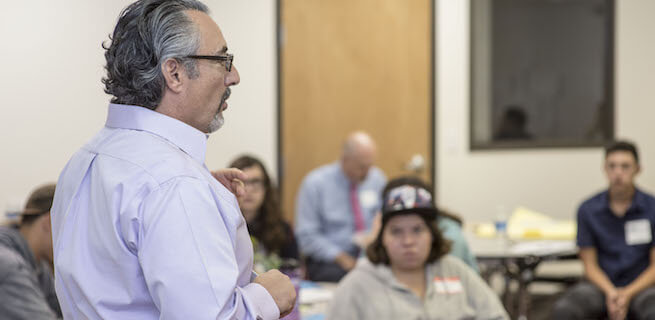Teacher Turnover in NM is High. Here’s How We Fix It.
By Tony Monfiletto, Director | July 27, 2017
In 1996, I left my job as a staffer in the New Mexico Legislature to become a teacher. I had a vision to give back to my alma mater, Highland High School. The experience was three years of trial by fire that I loved because I felt like I was helping young people become adults. However, it was the most professionally isolating time of my career. Imagine every day being so full with teenagers that you could go a week without a conversation with another adult. I loved those kids and I learned so much from working with them, but I felt like I was alone and I craved the chance to collaborate with my colleagues. I was surrounded by good teachers who cared about their students, but they were in a system so full of constraints that they they couldn’t work together to serve the young people better. I ended up leaving Highland High School in 2000 to cofound Amy Biehl High School with Tom Siegel who taught in the classroom across the hall from me.
NM Teacher Turnover Rate is Among Highest in Country
I’m afraid that teaching is even more isolating than it was when I left the traditional school system. The Albuquerque Journal recently reported that the State of New Mexico has one of the highest teacher turn-over rates in the United States. There was a lot of troubling data reported in this story, and some of the most worrisome findings show that our teachers are the most isolated in the country. They are alone in their classrooms with little connection to other adults in the building. The lack of professional collaboration among teachers has become the breeding ground for alienation.
How To Fix the Problem
One way to keep teachers in the classroom – and happy – is to change how our accountability system works. Rather than turning it over to testing companies, we can give the power to decide whether students have learned to the teachers. In New Hampshire teachers are responsible for teaching AND evaluating whether students have learned. Most importantly, the state has invested in their teacher’s professional judgement. To do this, the teachers are trained to agree on the definition of high quality work by students. Teachers do the evaluating and the state oversees the process to ensure that its valid and reliable. It’s a shift away from the compliance role by the state. This approach, known as the Performance Assessment Of Competency Education (PACE), asks the state to empower local schools to take control of their destiny and build the kind of vital organizations that build teacher competence and allow the school to grow and adapt.
After cofounding Amy Biehl with Tom, we searched for ways to help teachers feel less isolated and more valued. We ended up with a similar system and, now, the Leadership School Network is dedicated to the practice. I often hear from skeptics that charter school practices can’t transfer to traditional schools, but the PACE program in New Hampshire shows it’s possible.
Take Action
In 2017, the New Mexico Legislature passed Senate Joint Memorial 1 which was sponsored by Senator Michael Padilla. The memorial is a call to action for our state to find new ways to evaluate student learning and we must bring ideas like those from New Hampshire forward and adapt to our context. Like almost everything else that’s troubling in our world, the solutions to our problems are local. In this case, developing the talent we have in our local schools will help us prevent the brain drain and make our state healthier and more prosperous. By re-defining the role of teacher, we can transform our schools into highly collaborative and professional institutions which can help lift our community out of the poverty and despair that surrounds us.
Strategies like these inspire a deeper commitment to the teaching profession which is essential for us to re-establish one of the central building blocks for our community—the local neighborhood school that 90 percent of our students attend. Like Leslie Martinez Parker who authored the last blog on our site, I chose a career in education because I believe in New Mexico. However, counting on altruism is not a strategy for that will ensure the health and prosperity of our community.


